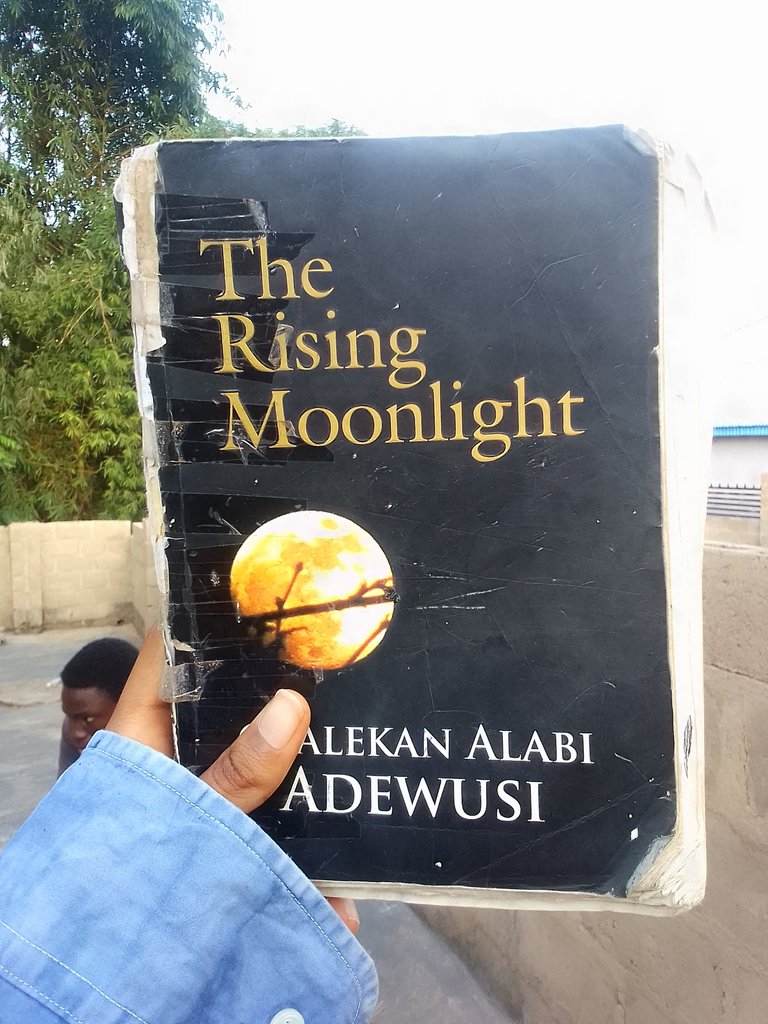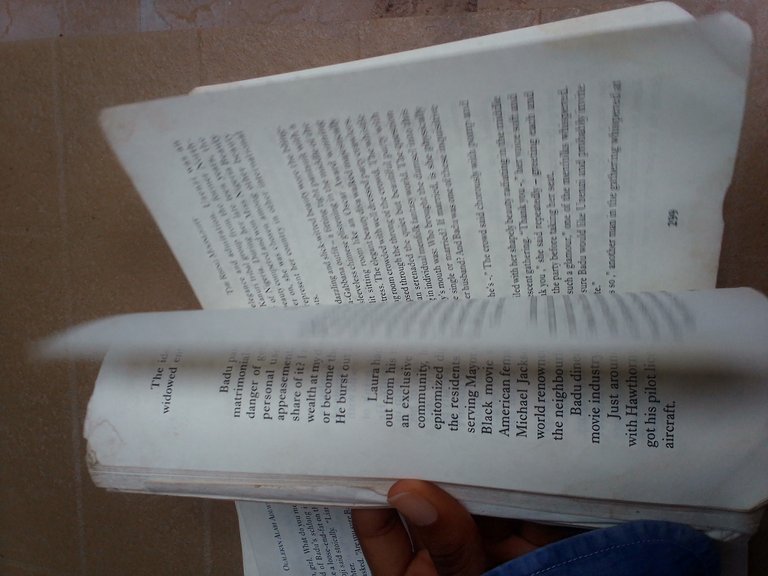The Rising Moonlight by Olalekan Alabi Adewusi: A Book review

It's been years since this book came into my possession. I don't still know how or where it came from but I just know I have always had it.
When I first set my eyes on it in my home, I didn't know what words were awaiting inside but the title caught my attention. Also, because the book was written by an author I had never heard of, curiosity got the best of me and I decided to give this book a go.
The Rising Moonlight is a work of art that explores African culture and traditions, specifically the Yoruba culture. It features culture, comedy, ambition and political power play in one piece. It was written to educate and enlighten young Nigerians in home and diaspora about their culture. And even foreigners can gain a lot of African cultural knowledge from this book.
This novel is filled with unforgettable characters and their development was impeccable. Adewusi’s literary work entailed the use of eloquent presentation, rich imageries and powerful use of literary expressions. The use of folklore proverbs and traditional songs was prominent in the novel.
One thing that drew me in was the use of humorous African proverbs to convey sarcasm and messages. Examples are, “We are talking of beauty among creatures of the earth and the frog is raising up it's little hand. Who doesn't know the frog is the ugliest creature God ever created?” and “ We are talking of animals which can kill it's prey with their horns and the snail is counting itself as one of them. Can a snail kill with it's so called horns?” amongst others. Now, let's do a quick exploration of what the novel is about.
The Rising Moonlight is first set in the rural village of Sowo, Abeokuta, Ogun State, Nigeria. This village is known for its residents who places great emphasis on communal efforts, education and spirituality/traditions. The residents of this village practices either the Christianity or Islamic religion, alongside their African tradition and lineage.
PLOT SUMMARY
The novel follows the birth of a boy named Kashimawo Badu Banjo in Sowo village. His parents had already tried to have kids nineteen times, their kids died prematurely until Badu’s birth. The Banjo’s had almost lost faith in procreating until they decided to hope and try one more time. This led to Badu's birth. Badu grew up to be an intelligent, sophisticated, fun loving and ambitious child with lots of folklore proverbs and lyrics.
Badu’s journey to glory started with a simple thing as reading a letter written in English to the local chiefs in his village. After relaying the letter, he was applauded for his reading prowess and was immediately recognized as an academic top rung in the community. As a result, he was gifted something by the Head Chief of the community. He was gifted a magic pebble named Edun Ara (The Thunder Stone). This stone’s purpose was for self protection against any form of danger. So far the stone was on him, he would always be safe. He was told never to lose it and never to tell anyone the purpose of the stone. Badu gave the stone to his father for safekeeping till he was old enough to use it and though his father was a devout Christian and clergyman, he also advised Badu to always ensure it was on him always. That was how strong he believed in the traditional practices of his people.
Badu eventually won a scholarship to a prestigious highschool where he became a princely personality. He was featured in a local newspaper for his scholarly achievement and after graduation from highschool, he was advised by his principal to apply for an advertisement which featured a scholarship award to study in North America. He applied, went for an interview where he performed well and he was awarded the scholarship. He was excited by his quantum leap from being a village kid to a United States Scholarship Award recipient.
This began his migration to the U.S to study. Before going, he was advised to always remember his African roots and never forget their practices and Badu cherished and appreciated this advice. He began his advanced educational pursuit abroad. Badu graduated as a summa cum laude honours student in his degree and he went ahead to earn his master of arts degree in Journalism and also completed an MBA programme.
Badu found love with a Black American named Laura. Their love blossomed and she made him become ardent in his faith in God. Badu worked as a journalist for a newspaper but he was served a notice due to cut down on overhead costs. This spurred him on to establish a newspaper publishing company with his wife. They named the newspaper, The Rising Moonlight and a featured tabloid on the Military junta who were ruling the helm of affairs in Nigeria catapulted the newspaper into fame. His publication was read in different countries around the globe. He became a well-known spoke-jock for the media. He was given the title of Olowe of Africa (Proverb Icon of Africa). He became an accomplished African immigrant in the U.S and was awarded the Wole Soyinka Literary Award. He dined and wined with the elite and mighty and was his name preceded him around the world.
A bit of misfortune set in when Laura had brain cancer. On her deathbed, she made Badu promise her never to fly an aircraft or engage in politics, and he promised it to her. But, after she died, Badu stubbornly went ahead to learn how to fly a plane and also started engaging in politics, saying,” What's life when somebody can't have a fair share of it?”. Her death also heated his interest in marrying another woman and travelling to his native country in Africa.
He met Uzenzi, a former winner of the Miss Nigeria Beauty Contest. It was a whirlwind romance and he married her. It seemed a cozy relationship, but it was a deep farce. Uzenzi was only invested in marriage foolery, just after Badu’s wealth and fame. This error would only lead to Badu’s downfall. Uzenzi disdained the African tradition and always claimed to be a born again Christian, though she had never been seen to step foot in a church. During a business trip, she would dissuade Badu from bringing along the Edun Ara and this would lead to his grisly death in a plane crash. Badu would be known as the illustrious son of Africa who, from grass to Grace went down at the apogee of his success.
This novel places emphasis on the African superstitious beliefs. It lays emphasis on all rites and rituals that takes place in the African land. It also serves to reflect the fast growing exodus of Africans to the United States of America. Adewusi created this book to educate young Africans who are apt to travel out of Africa to study, work, settle down and in most cases, adopt and embrace rhe newfound land as their domiciled countries. The concept infused into this book is to teach Africans and make them proud of their beliefs wherever they may be.

MY THOUGHTS
The author lost me in some parts as I spent more times
trying to dissect the meaning of big words in the dictionary. Also, the book was divided into parts and though I understand that some parts were meant to showcase the Yoruba culture, the parts didn't quite carry along with the rest of the book.
If you are an avid reader and learner of books that highlights traditions, this book is for you. I rate it 6/10 and recommend it to people who would like to splurge in the African culture.

Congratulations @terjix! You have completed the following achievement on the Hive blockchain And have been rewarded with New badge(s)
Your next target is to reach 800 upvotes.
You can view your badges on your board and compare yourself to others in the Ranking
If you no longer want to receive notifications, reply to this comment with the word
STOPCheck out our last posts:
Say no more, I'm getting this for myself.
I haven't found out yet if I enjoy books on African culture. This might just be the first. But following the plot, as you described, I might find it interesting.
Thanks for sharing this with me(us)😃
You are welcome.😊 I hope you enjoy it.
It is really interesting how this book manages to capture the richness of Yoruba culture and convey its importance, even for Africans in the diaspora. I was really struck by the character of Badu and his incredible journey. Thank you for this very detailed and thoughtful review!